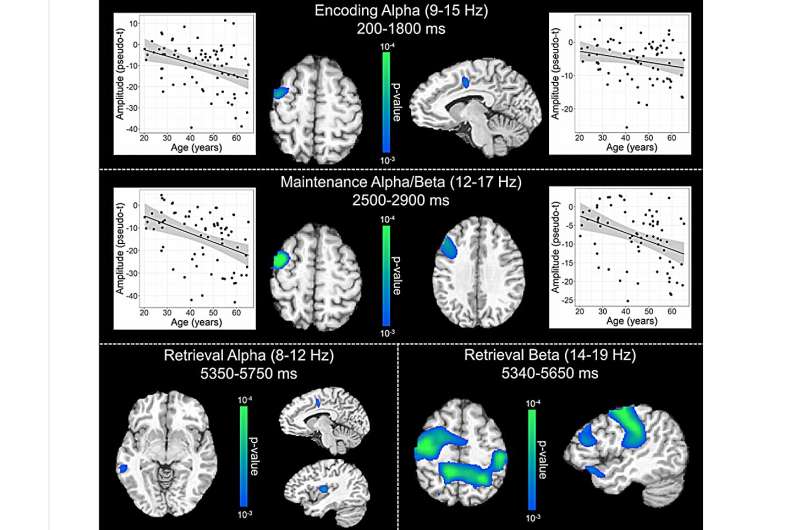This article has been reviewed according to Science X's editorial process and policies. Editors have highlighted the following attributes while ensuring the content's credibility:
fact-checked
proofread
Study: Age-related alterations in the oscillatory dynamics serving verbal working memory processing

A new research paper was published on the cover of Aging, titled "Age-related alterations in the oscillatory dynamics serving verbal working memory processing."
Working memory (WM) is a foundational cognitive function involving the temporary storage of information. Unfortunately, WM is also one of the most sensitive cognitive functions to the detrimental effects of aging. Expanding the field's understanding of age-related WM changes is critical to advancing the development of strategies to mitigate age-related WM declines.
In this new study, researchers Seth D. Springer, Hannah J. Okelberry, Madelyn P. Willett, Hallie J. Johnson, Chloe E. Meehan, Mikki Schantell, Christine M. Embury, Maggie P. Rempe, and Tony W. Wilson from Boys Town National Research Hospital, University of Nebraska Medical Center, Washington University School of Medicine, and Creighton University investigated the neural mechanisms serving WM function in seventy-eight healthy aging adults (range: 20.2–65.2 years) using magnetoencephalography (MEG) and a Sternberg WM task with letter stimuli.
"We hypothesized that older adults would require stronger engagement of key left hemispheric frontal and parieto-occipital WM hubs. Additionally, we expected that prefrontal activity lateralization (i.e., stronger left hemispheric activity) during WM performance would diminish as a function of age, with older individuals tending to utilize a more bilaterally distributed WM network," the researchers write.
Neural activity during the different phases of the WM task (i.e., encoding, maintenance, and retrieval) were imaged using a time-frequency resolved beamformer and whole-brain statistics were performed. The researchers found stronger increases in theta activity and stronger decreases in alpha and beta activity (i.e., more negative relative to baseline) as a function of healthy aging.
Specifically, age-related increases in theta activity were detected during the encoding period in the primary visual and left prefrontal cortices. Additionally, alpha and beta oscillations were stronger (i.e., more negative) during both encoding and maintenance in the left prefrontal cortex in older individuals. Finally, alpha and beta oscillations during the retrieval phase were stronger (i.e., more negative) in older participants within the prefrontal, parietal, and temporal cortices.
"Together, these results indicate that healthy aging strongly modulates the neural oscillatory dynamics serving WM function," the authors conclude.
More information: Seth D. Springer et al, Age-related alterations in the oscillatory dynamics serving verbal working memory processing, Aging (2023). DOI: 10.18632/aging.205403




















